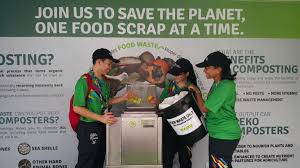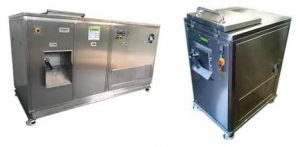
November 7, 2019, by Lisa Chin
Turning food waste to compost overnight with MAEKO
This post is contributed by Dr Cheng Shi Hui, Assistant Professor at the School of Biosciences.
Food waste in Malaysia has reached a critical level. According to data by Solid Waste Management and Public Cleansing Corporation (SWCorp), 55% of solid waste disposed at landfills comprises food. Malaysians contribute to more than 16,000 tonnes of food waste daily, which is enough to feed 12 million people three meals a day.
One of the ways to reduce food waste is through composting food waste. We visited Mentari Alam Eko (M) Sdn Bhd (MAEKO) located in Seri Kembangan to have a look at their composters and how the composter turns food waste into bio-organic compost overnight.
Mae Ooi, Sales Director and co-founders of MAEKO showed us the different composter series tailored to meet different market needs. They developed a comprehensive range of industrial composters such as CW series, RW series and MW series, which can be used by hotels, supermarkets, factories, schools and other F&B business of varying sizes. The largest CW series is able to consume tonnes of food waste of varying compositions (including large bones, coconut and durian shells, crustacean shells, and other conventional difficult to compost organic wastes) and churn out compost within (just) an impressive 24 hours duration. The conversion ratio is 10:2, that is, volume reduction of 80% from initial food waste to final compost. They also have a LQ series that converts organic waste into liquid that can be discharged directly and safely into drain. She also explained to us the unique benefits of MAEKO technology such as compact and space-efficient, simple and easy to operate, and no pre-treatment of food waste is necessary. We were amazed by the quick composting features of the MAEKO technology, which allows the food waste to be turned into bio-organic compost in just 24 hours. Another feature that truly surprised us is there is no foul smell during or after the composting cycle and it actually smells good!
Mae showed us the item that can be composted using the MAEKO technology, it was impressive to see the bones, shells, and mix food waste can be composted using the MAEKO technology, and then turn into bio-organic compost, which can be used as soil enhancers/conditioners to grow fruits and vegetables. Through the composting machine, we are able to reduce a huge amount of food waste from ending up in the landfills for no beneficial purpose and yet harmful to the environment (reducing the greenhouse gas emissions).
We enjoyed our visit to MAEKO. After the visit, we invited her and her team to come to UNM to have an in-depth discussion with other team members to look at their company’s needs.
Having said that, we appreciate the funding support provided as the visit and industrial networking would not have been possible without the support from the UNM Graduate School.
(Featured image) Source: MAEKO
-
Post a comment



